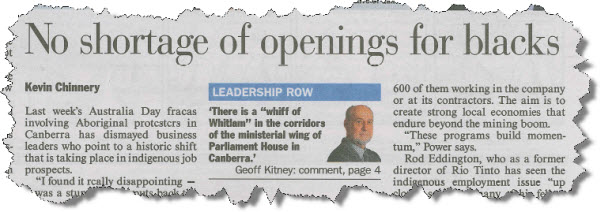Greg Dickson writes:
Crikey recently reported on the Australian Financial Review who recently reported on Indigenous employment. Crikey’s article didn’t focus on the topic, but rather the headline that the Fin Review put on their front page, wondering if it smacks of racism:

Plenty of us baulked at the use of “blacks” in this headline. My old boss and one of Australia’s most highly regarded Indigenous linguists, Jeanie Bell, did. And I did too.
But the Fin Review’s new editor, Mike Stutchbury, thought it was fine. To justify his choice of words, he pointed the finger at the ABC for using the word “black”, like when they report on “black deaths in custody”.
Sorry Mike, but the AFR’s “blacks” and the ABC’s “black” are not the same thing. There are times when we all need a grammar marm to help straighten us out and it seems that for Mike Stutchbury, that time is now.
When the ABC chooses the word “black” in “black deaths in custody”, it’s being used as an adjective. “Death” is the noun and “black” gives you a bit more detail, as adjectives tend to do. If I was gonna get all Linguistics 101 on you, I’d tell you that “black deaths in custody” is a noun phrase, “death” is the head, “in custody” is a complement and “black” is the modifier. But the point is, you can have a generic “death-in-custody”, or you can talk about certain kinds of death in custody by adding an adjective such as “black” or “Aboriginal” or “tragic” or “recent” or “South Australian” and so on.
The word “blacks” as used by the Fin Review in the headline above is different. It’s not modifying anything. It’s a straight-up, flat-out, card-carrying noun. And it’s a noun I doubt you’d ever find used on ABC headlines.
The ABC’s adjectival “black” might be a little offensive in certain contexts, but using “black” as a noun, as the AFR has done, is not on. As Jeanie says,
“In my mind when you hear someone using the word ‘blacks’, I, as an Aboriginal person, associate it with colonial language generally spoken in harsh tones with a sense of utter dismissal and bordering on hatred or strong resentment, such as ‘the dirty blacks’ or ‘drunken or lazy blacks’, etc. All of which I find extremely offensive and know many others who would also.”
To help demonstrate my point about adjectives versus nouns, consider Muriel Heslop: when she meets a hunky, obviously white, South African to arrange marrying him, she stupidly asks:
“Are you black?”
I could imagine some situations where I could ask a light-skinned Aboriginal person this same question and not feel like my personal safety would be in immediate danger. Like Muriel, you might sound like a twit, but I don’t think it’s outright offensive. But if I met someone in a pub, started chatting and then enquired Fin Review-style:
“Are you a black?”
I don’t think our friendship would blossom much further. Because: (a) I would only ask that if I was racist or totally ignorant and; (b) if the person I’m talking to actually is Aboriginal, then I would have just offended the crap out of him/her.
What if it was a few years ago when Jeanie and I both worked at Batchelor Institute of Indigenous Tertiary Education. I could conceive of telling a friend of mine that “my boss is black” and not be too terrified that I would lose my job if Jeanie or any of my co-workers overheard me. But if I said, “my boss is a black”. Well. I-… I-… just wouldn’t. Ever. Ew. That’s horrible language. Don’t use it!
So to summarise:
blacks: noun. offensive.
black: adjective. not-so-offensive.
Australian Financial Review: fail.
ABC: pass.
Crikey: solid journalism and linguistic analysis but would be nice if we gave a stuff about Indigenous employment too.
Jeanie Bell: legend.
Muriel Heslop/Mariel Van Arkle: also a legend.
Aboriginal people: probably still wondering when white people are going to get over themselves and do something more useful with their time.







Crikey is committed to hosting lively discussions. Help us keep the conversation useful, interesting and welcoming. We aim to publish comments quickly in the interest of promoting robust conversation, but we’re a small team and we deploy filters to protect against legal risk. Occasionally your comment may be held up while we review, but we’re working as fast as we can to keep the conversation rolling.
The Crikey comment section is members-only content. Please subscribe to leave a comment.
The Crikey comment section is members-only content. Please login to leave a comment.